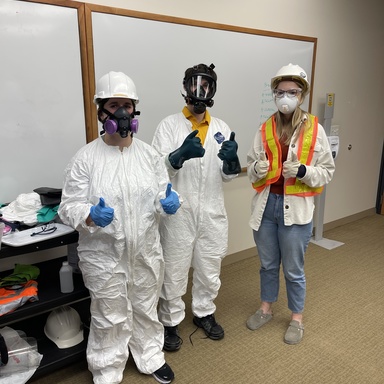Breadcrumb
Teaching Assignments and Philosophy
Primary teaching responsibilities are in the College of Public Health, particularly in the Department of Occupational and Environmental Health. Fundamental knowledge and skills are developed in the following two courses:
- OEH: 5140 Occupational Safety
- CPH:3200 Death at Work
Additionally, advanced exposure assessment skills are taught in the following course:
- OEH: 6460 Quantitative Exposure Assessment

The following summarizes some of my teaching philosophy and how I like to structure courses and learning assessments:
To successfully educate future health and safety professionals, one must recognize the following: we cannot possibly educate all students on all health and safety risks. I believe that it is our goal to provide students with foundations in the methodologies necessary to examine a health hazards, identify risks, and develop interventions. To be successful in the field, safety and health professionals must be able to apply these methodologies to the wide range of hazards to which workers and the general public may be exposed, including those that may develop in the future with new technology development. Thus, the goal to my teaching philosophy is to ensure graduates from the industrial hygiene and allied programs have the tools and confidence to make sound decisions to protect the health of populations they will be serving, regardless of the nature of the hazard.
My teaching approach is “learn by doing.” For this reason, I incorporate laboratory, field-projects, and other activities into my courses whenever possible. My classroom teaching leads students through three phases: understand, demonstrate, and interpret. I first provide students with tools to gather information, such as information on equipment, regulations, or calculation methods. Then, I demonstrate how to perform a specific type of assessment (monitor, observe, calculate), with assignments targeted to allow students to perform their own similar assessments. Finally, I work with students to have them gather information and evaluate their findings to encourage data-driven, scientific interpretations. I also encourage students to select topics of personal interest when they design their class project. I evaluate the strength of their hypotheses, the correctness of their methods and analyses, and the appropriateness of their interpretations. During class projects, students learn what it feels like to get an answer to a question of their own choosing, within the scope of the assessment tools they are studying.